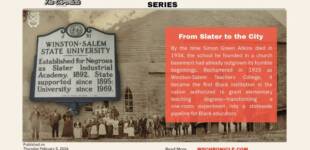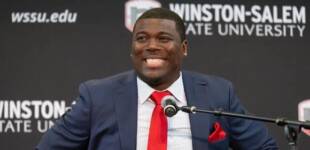Community hails 2 hero Capitol Police officers
Photo provided by Congressman G. K. Butterfield's Office- U.S. Capitol Police Special Agent David Bailey and U.S. Rep. G. K. Butterfield meet up at the 2017 Congressional Baseball Game last Thursday. They both graduated from N.C. Central University.
As of June 14, beyond the U.S. military, the nation has celebrated two new American heroes who not only reminded us of what true bravery is in the face of certain danger, but also of the constant threats our elected officials face in what many agree is a very divisive, corrosive atmosphere.
On the morning of June 14, U.S. Capitol Police Special Agents David Bailey and Crystal Griner rushed into the line of fire when an angry gunman, armed with an automatic weapon and reportedly searching for Republicans to kill, began firing his weapon at a public park in Alexandria, Virginia, where several GOP members of Congress were having baseball practice for a charity game later in the week.
When it was all over, the gunman was killed, but not before he had shot and wounded at least three others, included U.S. House Majority Whip Steve Scalise (R-La).
Rep. Scalise is still in a Washington, D.C., hospital recovering from a bullet wound to the hip that once had him in critical condition.
In a speech on the U.S. House floor later that June 14 morning, Speaker Paul Ryan, calling Bailey and Griner “heroes,” said, “We are, as ever, awed by the tremendous bravery of the Capitol Police. I expressed our profound gratitude to them. It is clear to me, based on various eyewitness accounts, that without these two heroes — Agent Bailey and Agent Griner — many lives would have been lost,” Ryan added.
Special Agent Crystal Griner, 32, who was shot in the ankle, is known as a “high achiever” scholastically and former basketball standout for Hood College in Frederick, Maryland. Her former chief with the U.S. Capitol Police said she exuded “confidence and dedication.”
U.S. Capitol Special Agent David Bailey, 32, is a 2007 alumnus of North Carolina Central University (NCCU) in Durham, from where he earned a Bachelor of Science degree in physical education, and was a member of NCCU Student Government. He reportedly attended high school in Maryland.
Bailey has reportedly been a U.S. Capitol police officer since 2008, and an administrator at U.S. Fish and Wildlife before that.
Bailey reportedly twisted his ankle during the shooting, and he was released from the hospital that Wednesday afternoon.
In a statement issued June 14 by Interim NCCU Chancellor Dr. Johnson Akinleye, David Bailey is said to have “… bravely put his life on the line to protect and serve the community. This example of ‘Truth and Service’ comes as no surprise to his professors who knew him to be an engaged and empathetic student who was committed to excellence.
Those who knew Bailey as a student at NCCU recall a young man who cared about people, always kept himself physically fit, and always had a close eye for detail, an important attribute that serves him well as a law enforcement officer.
NCCU Professor David Nass remembers teaching Bailey in “Motor Skills in Games” in 2004, and that he had the “highest grade in the class.”
“What stood out about David Bailey was his attention to detail and his preparation,” Professor Nass recalls. “He was the kind of personality you or I would want to teach our child.”
Another professor at NCCU, Virginia Politano, said that David Bailey was a “good student” with a 3.5 grade point average in her course. She remembers Bailey as being “outgoing and personable,” and liked by everyone. Bailey was involved in campus organizations.
“He was a good guy; always wanting to help other people,” Professor Politano said.
U.S. Rep. G. K. Butterfield (D-NC-1), is an alumnus of NCCU, and says he’s knows David Bailey personally.
“He’s a heroic brother. I’m very proud of David,” Rep. Butterfield said Tuesday by phone from Washington, D.C. “I’ve known David for the past eight or nine years since he came on the [U.S. Capitol Police] force. I know him in a very special way because both he and I are graduates of North Carolina Central University.”
Rep. Butterfield added there aren’t that many black officers on special leadership detail on the U.S. Capitol Police force, so African-American members of Congress instinctively bond with the few who are, checking with them routinely to make sure they’re alright.
“We’re proud of ‘em,” the former chairman of the Congressional Black Caucus insisted. “We have fought to get them these opportunities in the leadership detail.”
Butterfield said he’s always been impressed with how professional and dedicated Bailey is, and while he didn’t know Crystal Griner as well, has always been very impressed with how professionally she carried herself while on the job.
Referring to the June 14 shootings, U.S. Rep. Alma Adams (D-NC-12) said all members of Congress are “really shaken” by the assassination attempt. She believes the time has come for more “good guys” like David Bailey and Crystal Griner to provide better security for her and her congressional colleagues.
“It could have been any one of us,” she said Monday by phone from Charlotte.
Long before the events of June 14, Rep. Adams told her staff to consider any nasty phone calls or letters received in their offices as “threats” and report them accordingly. The afternoon of June 14, Adams released a statement:
“Today’s shooting is a tragic reminder of the rising animosity and tensions in our country.”
“One of the things I think Congress has the responsibility for is setting the right tone, because if we don’t, then the community outrage is going to get out of control,” Adams says, acknowledging that other black congresspeople have also gotten threatening calls and letters as well.
Rep. Al Green (D-Texas) is most prominent on the list, ever since he announced that he was sponsoring a bill to present articles of impeachment against President Trump.
“We just have to be a little more diligent about safety and security,” she continued, noting that the days of not making mandatory security arrangements at public events is over. “I am very concerned, not just for myself, but my staff.”
Rep. Adams also cautioned that Congress has to do a better job protecting itself, but all Americans, especially when it comes to limiting the sale of guns.
One of the last shooting incidents involving a U.S. Capitol Police officer from North Carolina took place in July 1998, when Officer Jacob Chestnut was killed at the U.S. Capitol building when a gunman entered the security screening area and opened fire, killing Chestnut instantly, and also a detective. Officer Chestnut was the first African-American to be laid in honor in the U.S. Capitol Building. Then President Bill Clinton delivered his eulogy.









